#edit: analysis in the reblogs
Text
I genuinely think that Guda could survive in the SW universe but Anakin would not be able to handle any of the shit that happened in Fgo
#I can give an actual analysis if anyone is interested#edit: analysis in the reblogs#quick reminder that Guda has also DIED and was brought back I think shits a bit off the scales#anakin would crumple like a wet napkin the moment Shuten ran her hand through his side sorry besties#like GO was rough but EOR was straight up ‘you got fucking stabbed’#the lostbelts currently are traumatizing I’m suffering#double bonus of the gudas being at least somewhat familiar with lightsabers because. saber wars.#star wars#star wars: the clone wars#star wars the prequel trilogy#fgo#star wars: the expanded universe#fate#fate go#fate grand order#anakin Skywalker#ritsuka fujimaru#fgo gudako#fgo gudao#Kiwiki Speaks
84 notes
·
View notes
Text
thinking about how eiji's a pole vaulter and how ash talks about eiji "flying" and how eiji's associated with bird imagery and how eiji's free (unlike ash) and how eiji comes in on a plane and leaves on a plane and how ash cannot fly, ash cannot be free, how nyc is ash's prison, and how ash is the leopard who dies climbing the mountain, unable to live at such elevation, how he was trying to reach the sky and be free but was always stuck to the earth, how he chose to die instead of climbing back down, how he chose to die where he could see the sky and hope and freedom almost like a bird with eiji's letter right in front of him rather than letting everything go wrong and ruin it once again, how eiji's a failed pole vaulter anyway, how a bad fall ruined his career and grounded him (physically and emotionally), how it took flying to america and meeting ash and needing to save him and skip for him to try flying again, how he landed hard and harsh and still the thought of that escape compelled ash to protect eiji at all costs because if he could fly that means something to him, even if he doesn't think he can fly, how eiji is the manifestation of his hope and how when he breaks and asks eiji to stay with him a while he folds himself over his legs and weighs him down and traps him and grounds him, how ash fights like hell to keep eiji alive not because he thinks he can be like him (hopeful, flying, innocent), but because he makes him forget the gravity of his situation, and so he can see eiji fly again. how he wants to see him escape. how eiji is a bird and ash is a wildcat and how ash never once saw eiji as prey. how eiji never saw ash as a predator. how it is eiji's naivete that first endears ash to him, how it is his freedom and flight and removal from darkness and his ability to leave that darkness that really roots eiji in ash's blood as something essential to him keeping on living in this hell of nyc. how it is that distance from the violence and that hope for the future that ash chooses to surround himself in as he dies. how ash dies in a dream because he feels more than anything that he can't fly like eiji, that he can never leave. how his violence is a part of him and will be forever, how it weighs him down. how he wants to enjoy the view from the mountainside rather than looking up from the ground below. as if they can both fly. as if he is with him up there and not grounded. eye-to-eye with what he can't have, seeing eiji's homeland: the sky. how he dies trying to reach the top because he couldn't take retreating and trying again. how ash, tired and tired and tired and convinced it will go on forever if he crawls back down the mountain, chooses to close his life deluged in eiji, in eiji's insistence that they can fly together, in eiji's hope for him and for them, in eiji's beautiful dream. how ash dies without trying to realize that dream. how ash, in dying, destroys it.
#banana fish spoilers#I'M HAVING A FUCKING MOMENT#mutual reblogged exactly one (1) piece of ash fanart and sent me on A Multiple Hour Long Thing and now im rewatching it lol#yes i am only on episode 2 yes i am still going to write big long analysis posts ANYWAY#whatever hope this makes sense. anyway#banana fish#okumura eiji#ash lynx#asheiji#hhhhh i can't believe i've only watched this twice in like what 5.5 years?? sheesh#anywayyyyyyy i care about them a lot ok. god#and yes i DO kinda have beef with the decision to kill ash off at the end but it really does say so much About his character#that he chose to die in the way that he did even though he's been throwing his life away since episode 1#dying in peace in comfort in solitude rather than in some chaotic battlefield.... ough...... in the peace eiji alone could give him.....#anywayss i relate to ash a little more than i should so. this one's for us cool guy bottoms up#edit i uh.... i forgot it was a leopard.... in the story..... but whatever it doesn't really affect the symbolic meaning it's just embarras#ing that i forgot >;/
180 notes
·
View notes
Note
C-PTSD as a diagnosis makes so much sense for Ford because he really does fit almost all of the criteria, ESPECIALLY if you take the stuff in J3 into account in conjunction with his traumatic childhood (bullying, bad dad, etc.). It just makes sense in regards to his motivations and his issues with interpersonal relationships (like with Stan). Also buring yourself in your work (like he does) is a very common 'flight' coping mechanism to trauma in adults

I'm smiling like this right now
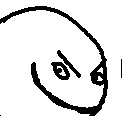
ford's whole.... mental health deal is extremely interesting to examine because Oh my god this man is the textbook image for "reacting to ongoing, continuous trauma". intentional or otherwise (I'm inclined to believe it's both).
like. okay hang on I'm about to get very in depth with it
I feel like there's no way this entire guy's life and in some ways his lasting identity haven't been defined by and constructed around various forms of trauma, maybe the most obvious and true-to-canon-intent being peer abuse/bullying from childhood. a lot of people downplay the impact of this type of abuse but it's... responsible for a lot of social ills in shocking ways. (if you're more interested in this topic here is an article my friend mer linked me a while back, it gets into it very deeply)

(a lot of this is going to be sourced from the wikipedia page for CPTSD [and my own experience Living with it] which I realize isn't very professional of me but Whatever this is tumblr)
one of the core tenets of ford's personality is that he's Different. he owns it, sure- his six fingers become a point of pride rather than something to be ashamed of- but they make it extremely clear that from a young age he associated being different with being a social pariah. ford's generation was characterized by notoriously cruel bullying, and anything that remotely made you stand out rendered you a target. ford could've been bullied for being nerdy and jewish (and failing to perform socially, ie dating) alone, having such an obvious mutation definitely was not winning him any points.
so it's honestly no surprise, when from childhood ford feels like he has One person in the world to trust and confide in, that he would go on to form very unhealthy attachment patterns typical of CPTSD. as you elaborated on regarding AvPD (which I know far less about but seems to have comorbidity with CPTSD): if you're hard-wired to believe socializing with others results in failure or betrayal, then you're not going to make an effort. but what does end up happening is that you're going to pour all of your trust and dependency into one person at a time, one person who is "safe".
previously, that was his brother. and it's not really hard to draw the conclusion from there that fiddleford was a subject of ford's attachment style, considering he was his One friend from college, and... one of Maybe two people ford is friends with at all who he isn't related to. he cites him as the only person he can possibly trust to work on the portal project alongside him, and he still can't bring himself to tell him the full truth, because he's terrified of losing him. I love their dynamic (I do think they were mutual best friends, and there was no small amount of trust reciprocated between them. "fiddleford was weird as hell too" is something I keep coming back to) and I don't think it's built on entirely unhealthy terms, but that kind of pressure is... setting things up to crash and burn.
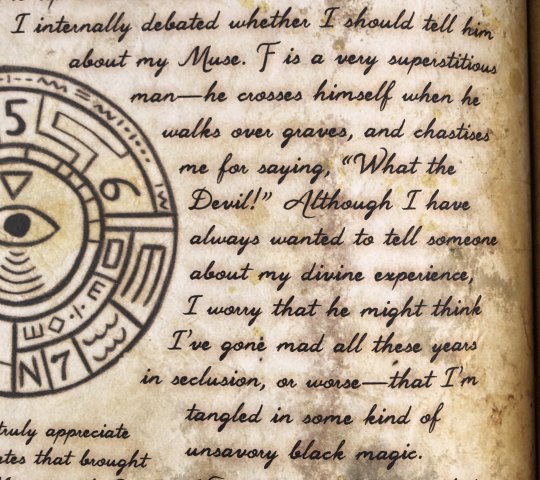
enter bill stage left. back to "continuous yearning to be liked and accepted"- this guy knew that and made every effort to prey on ford's insecurities to reel him in as close as possible. this is what really pisses me off about the idea that bill was just "inflating ford's ego", because it's way, way more insidious than that. throughout the entirety of journal 3 we see ford reintroduce someone to his life he has a very positive relationship with (fiddleford) and how that trust gets gradually broken down by bill's influence "winning out" over their friendship. I think it's safe to say ford was already vulnerable: from the start, he'd been isolated in his research for six years (and it's unclear for how long he'd known bill by 1982), and bill proved time and time again to be someone who wouldn't judge him, someone who would praise him for his hard work, and perhaps most critically, make him feel like being different was something special.
like that's... that's really not good!!!! and that kind of thing works wonders on someone who has already settled with the idea that they're inclined to be alone just by design.
trying to put a cap on this. in relationships like the one he's had with his brother or fiddleford it doesn't even necessarily have to be ""toxic"" (vague term anyway) or outwardly bad to be built on unhealthy attachment patterns, and considering for a good chunk of ford's life his attachment to others can be characterized as "I can only trust ONE person at a time" it feels essential to any discussion of his CPTSD or canon trust issues. That is something that happens a lot in Real cases of CPTSD (hi) and only further snowballs into More trauma by leaving you vulnerable to manipulation and abuse (see: bill.)
I've been going on for way too long now and I feel like I've only scratched the surface of the thing I wanted to elaborate on sorry. that post traumatic stress disorder can complex

#lab notes#I woke up and had to answer this before anything else but I really need to Eat so apologies if this is all over the place. running on empty#edit: this is ok to reblog ! all of my gf theorizing/analysis is unless I clarify it isn't for whatever reason
101 notes
·
View notes
Photo

The power this single frame has is mindblowing
#I'm speechless I'm stunned I'm mindblowed#I'm obsessed#ranpo edogawa#bsd#bungou stray dogs#bsd s4#bsd season 4#Edit: analysis in reblogs
580 notes
·
View notes
Note
I was joking a while back that the actor they have playing KDJ for the orv movie was too handsome for him and a friend who's read orv was like "KDJ is actually secretly attractive!!" And I just felt my soul leave my body right then
SIGHS...
Okay. Buckle in. I'm gonna finally actually address and explain and theorize about this whole...thing.
I'm not gonna cite any exact chapters cause it's like 11:30 and I've got an 8 hour drive in the morning but I'll at least make an approximate reference to where certain things are mentioned. Also, this post is just my personal interpretation for a good bit of it, but it's an interpretation I feel very solid about, so do with that what you will. Moving on to the meat of things:
There is one (1) instance in the web novel that I know of which describes specific features of Kim Dokja (especially ones other people notice). This takes place when members of KimCom are trying to make Kim Dokja presentable to give his speech at the Industrial Complex (after it's been plopped down on Earth). This is when they start really paying attention and focusing on Kim Dokja's appearance since they're putting makeup on him; I still don't think they can interpret his whole face, but they can accurately pick out and retain more features than usual. If I remember correctly they reference him having long eyelashes, smooth skin, and soft hair. These features can be viewed as (stereotypically) attractive.
Certain parts of the fandom have taken this scene and run with it at a very surface level, without realizing (or without acknowledging at the very least) that this scene is not about how Kim Dokja looks. This is, in part, due to not realizing or acknowledging why Kim Dokja's face is "censored" in the first place, and what that censoring actually means. I think it's also possible that some people are assuming the censorship works like a physical phenomena rather than an altered perception.
I'll address that last point first. The censorship of Kim Dokja's features is not something as simple as a physical phenomena. It's not a bar or scribble or mosaic over his face. If that were true it'd be very obvious to anyone looking at him that his face is hidden. But his face is not hidden to people. They can look at him and see a face. If they concentrate on his eyes, they can see where he's looking. They know when he's frowning or grinning. They see a face loud and clear. But what face are they seeing? Because it's not really his, whatever they're seeing.
No one quite agrees on what he really looks like. And if they try and think about what he looks like, they can't recall. Or if they do, it's vague, or different each time. We notice these little details throughout the series. Basically, Kim Dokja's face is cognitively obscured. Something - likely the Fourth Wall, though I can't recall if this is ever stated outright - is interfering with everyone's ability to perceive him properly. This culminated in him feeling off to others; and since they don't even realize this is happening, they surmise that he is "ugly."
Moving on to the other point about what the censorship means: To be blunt, the censorship of his face is an allegory for his disconnect from the "story" (aka: real life, and the real people at his side). The lifting - however slight - of this censorship represents him becoming more and more a part of the "story" (aka: less disconnected from the life he is living and the people at his side). The censorship's existence and lifting can represent other things - like dissociation or depersonalization or, if you want to get really meta, the fact that he is all of our faces at once - but that's how I'd sum up the main premise of it. (The Fourth Wall is a larger part of the dissociation allegory, but that's for another post).
So you see, them noticing his individual features isn't about the features. It's not about the features! It doesn't matter at all which features got listed. Because they could describe any features whatsoever and it would not change the entire point of the scene. Because the point isn't what he looks like. The point is that they can truly and clearly see these features. For the first time. They are seeing parts of him for the first time. Re-read that sentence multiple times, literally and metaphorically. What does it mean to see someone as they are?
This is an extremely significant turning point dressed up as a dress-up scene.
---
P.S. / Additionally, I'm of the opinion that Kim Dokja is not handsome, and he is not ugly. He is not pretty, and he is not ghastly. Not attractive, nor unattractive. Kim Dokja isn't any of these things. More importantly, Kim Dokja can't be any of these things. The entire point of Kim Dokja is that you cannot pick him out of a crowd; he is the crowd. He's a reader. He's the reader. Why does he need to be handsome? Why must he be pretty? Why is him being attractive necessary or relevant? He doesn't, he doesn't, it's not. He is someone deeply deeply loved and irreplaceable to those around him, and someone who cannot even begin to recognize or accept that unless it's through a love letter masquerading as a story he can read. He is the crowd, a reader, the reader. He's you, he's me. He's every single one of us.
#orv#orv analysis#orv meta#orv spoilers#mine#ask#there's also the meta that he is described with these (stereotypically) pretty features as they are about to try and 'sell' him to a crowd#which feels to me like a very pointed way to convey how 'beauty' is commodified. how audiences like 'attractive' characters more#note: made some edits to add in a couple of sentences my brain forgot in the moment so make sure u reblogged those if u do#tag edits for further commentary that isnt strictly relevant to the point i was making:#do i think that this face censorship was executed as well as it could have been? nah.#not that it was like. done Badly. it's followed through to a certain point. its established enough for me to make this post at least.#but i do think it is the one thing in the web novel that SS didn't capitalize on.#like. they still stuck the landing but it was not as picture perfect of an execution as the rest of the metaphorical stuff in orv#also. this (not the face censorship specifically but the 'hes just some guy' point of it all) is one of the big reasons i think that-#-visual adaptions of orv can never quite work. they can do the best that they can with that medium but a lot of nuance is lost-#-simply by virtue of it being a visual medium#i personally think the only way a visual medium could work would be one where they commit to the power move of not showing kdj's face#(until a certain point (of view) that is)#his face is always facing away or out of frame or hidden by someone or something else in the way#commit to the fucking allegory or simply perish
268 notes
·
View notes
Text
hey tumblr last night because i'm normal i decided to rewatch and annotate howls moving castle and i would just like to share some favorites of my 4am frenzy
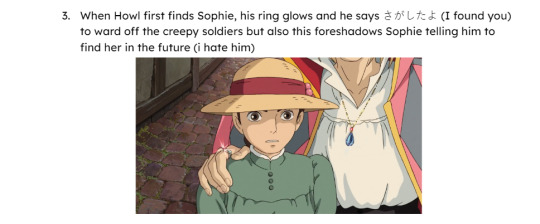
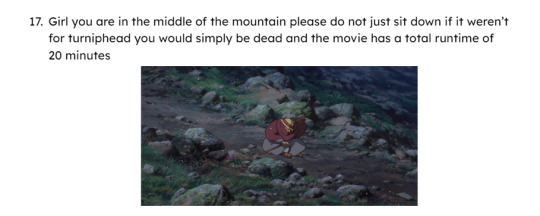

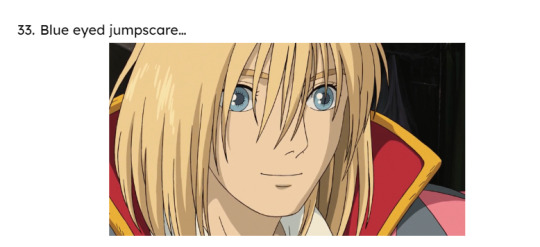



#whats wrong with me by the way#i wrote 23 pages of commentary and analyses#edit: you can find the full doc in the reblogs#howls moving castle#howl pendragon#sophie hatter#calcifer#analysis#??#movie analysis
125 notes
·
View notes
Text
Everything about Scar's treatment in Brotherhood sucks so bad, but there was something specific that has been bothering me for awhile. I hadn't been able to quite put my finger on what it was since watching FMAB for the first time recently (as a lifelong 03 fan). So I rewatched FMA 03 again and it finally clicked what it was that further upsets me about Brotherhood regarding Scar, besides the more obvious imperialist propaganda and racism:
The Elric's relationship to him.
Now obviously Ed's racism towards Scar in Brotherhood is pointed out frequently enough, but it doesn't stop there. It's the way that Brohood Ed is incapable and fully resistant to ever bridging that gap besides a deeply uneasy allyship-of-convenience. Al is also fully distant from Scar, besides their mutual antagonism in the earlier arc. And nothing more is really explored here between these characters.
And I didn't realize how much I valued the way 03's Scar, Ed, and Al contrast, overlap, mirror, battle, and support one another. Their fates and goals are inseparable. Alchemy's impact on the Elrics' lives is reflected with Scar's life and his brother's, as well as their familial relationship to their own brothers; many point out the similarities between 03 Scar and Al, with some noting how Ed and Scar's brother match each other. And the way the Elrics here are more able to engage with the harsh realities that inform Scar's choices and actions versus that of their place as Amestrians, and for Ed as an active member of the military who, despite wanting to cling to his principle of never taking a life, at times can see Scar's point of view and even, with reticence, sympathize with him (Al even more so).
There are layers to the relationship across these three characters. The tension and humanity that arises is a driving force in revealing the dialectics of this show. It's to the point that Al and even at times Ed defend Scar when talking with other characters towards the end of the show, and they even ultimately owe their lives to him (the philosopher stone and grand arcanum that allowed both Ed and Al to live, and for Al to regain his body). And the bond between the Elrics help Scar to forgive his brother, to speak aloud that he loves him in his final moments, before triumphantly accomplishing his goal against the Amestrian military, saving the remaining Liorans, and saving Al from becoming Kimbly's final bomb.
And there are other moments, such as Scar helping Al in Lab 5, telling him he sees his unmistakable humanity after Al helps him save Ishbalan refugees. Scar attempting to help Ed in Lab 5 after he refuses to sacrifice the prisoners for the Philosopher Stone, because he sees the humanity in Ed too, the humanity that can resist merely being a ruthless military dog and scientist. The way Scar treats Al almost like a little brother of his own, and when he mentions that Ed and his older brother share the same kind eyes- said at a time when Scar still harbours ill feelings for his brother's taboos and his sacrifice; which becomes all the more poignant when he forgives his brother before creating a Stone passed down to the Elrics. Scar mentions having sworn off specifically targetting state alchemists post-Lab 5, and this feels like his way of sparing the Elrics of his wrath, even as he holds fast to fighting against an oppressive system with necessary violence. The material here is rich for analysis and appreciation! It doesn't settle on more digestible, black-and-white character archetypes and plot conveniences.
There's a reason why the final outro for 03, where it flashes across four deceased characters who mattered to the Elrics, includes Scar. The man is in the ranks of Trisha, Nina, and Hughes! This isn't a mistake, the writers are intentionally showing the indelible impacts of these people who they cared about.
But with FMAB, it's exceptionally flat here and entirely derogatory. Ed hates Scar, and the narrative treats him as wholly right to do so. Scar needs to repent and reform to the side of his genociders, and never shall these characters interact or converse beyond putting a stop to Father. Scar was nothing more than a vehicle to reach his murdered brother's alchemic research, and an example to be made of any radical who so much as raises a finger against the State. All three of these characters want nothing to do with each other, and that's about as far as we get with them. In Scar's own words, he's nothing more than the 'ooze' (the poison) that arises from military conquest, and by the end of the show it's clear that, even with Scar saving the entire country that destroyed his life, to the Elrics, he will always be that 'ooze'.
In Brotherhood Scar committed what the Elrics clearly considers to be the ultimate sin: he killed Winry's parents, and no matter the circumstances surrounding that event, no matter what else changes, no matter which mass murderers, monsters, and genociders the Elrics can sympathize with, humanize, befriend, and forgive, Scar will never be anything more than an unforgivable murderer. The best everyone gets here is moving on and living seperate lives. Nothing more.
The fact that Ed openly wishes he could beat the shit out of Scar, he verbalizes as such while Winry patches him up and Miles lectures him about the value of reforming the military regime to include more racialized people for its imperialist complex. And the big mercy Ed in this moment offers to Scar is... Not kicking the shit out of him after all.
The juxtaposition between these adaptations, the cold hatred of FMAB versus the entangled, poetic antagonism and comradery of FMA 03 makes experiencing the former anime so depressing. Until watching Broho it never dawned on me just how much I truly appreciated the complexities between Scar and the Elrics in 03. Finding Scar's Earth counterpart at the end of Shambala wasn't just a fun cameo: it feels like a road that leads back to an ally.
At least now I have something I can more consciously enjoy whenever I revisit 03, while articulating yet another reason why I can't stand Broho.
#fma#fma 03#fmab#this def needs editing but its late and i wanted to get my thoughts out there#the antagonism and humanity and comradery of 03 is achieved with so much subtlety and skill#it never ceases to blow me away#eta: ok so i spruced up the post a bit. this is still a bit of a messily written meta but eh#also i'll probably reblog this later on with further analysis and examples of how 03 handles the Scar-Elrics bond
42 notes
·
View notes
Text
the thing that gets me so much about the storytelling in knives out is that it's a story within a story within a story- or i guess more accurately, it's a story about multiple stories being told and acted in and against each other. ransom/hugh/supreme scumbag wrote the story of harlan's murder and of pinning the crime on marta; meanwhile, harlan wrote the story of what marla would do in the aftermath of his death and the ensuing investigation.
problem for mr. hugh is, marta is not a flat character or a pawn in his game he can manipulate to his will to ensure he gets away scot free (and, to a lesser extent, despite harlan's insistence and marta's best efforts, marta cannot carry out his lie for long during the high-pressure investigation. even when it's in her own best interest to lie, marta cannot and will not be manipulated into telling a false story). marta is a smart and caring human being who has agency in her narrative- and since she is the heroine, the narrative wants her to win, so she has allies like blanc on her side. blanc mostly doesn't interfere with the stories being told, he observes them and then, as he says, strolls leisurely along the real story- the truth's- axis and eventually comes to its inevitable conclusion. this is when he will step in and act upon the narrative, but only to reveal the truth and to ensure the hero gets the rewards they deserve.
on top of all that, it really gets me how there's a very meta framing device of the primary murder victim in this mystery being a famous murder mystery author, and much of the plot revolving around his efforts to author what his loved ones' lives will be like after his death... and the way hugh's murder plot is like something right out of a harlan mystery novel (to the point that harlan, before he realizes he's about to die, makes a point to write down the method of murder as an ingenious way to kill someone)....... and all that isn't even considering all the stories the family members tell themselves and others about their relationship to harlan, how they view the family legacy, etc.
marta is the heroine precisely because she is not trying to tell a false story for her own gain (as the family accuses her of doing after the reading of the will)- she is simply concerned with carrying out her late friend's wishes and doing right by him. she is probably the only person who really knew harlan, the full truth of him, and was his friend without any selfish agenda. she is a good person, a person who would never try to claim another's story as her own, which is exactly why harlan trusted her with his life, his home, and his legacy. he couldn't have known what would happen, but he knew she would do her best to honor his memory after he was gone. ultimately though, no matter who else tried to write or edit it (including harlan), this is marta's story and hers alone to live and change and discover.
this has been a long post already so i'll end it here but suffice it to say that over four years post-release, i'm still so fascinated by the ways these characters actively try to either rewrite the story playing out in front of them, or reveal the truth at the heart of things (as blanc would say, the hole inside of the donut's hole). this movie just makes my storytelling and puzzle-loving nerd heart go BRRRRR
#knives out#knives out 2019#mine#knives out meta#knives out analysis#idk what else to tag 🤷🏻♂️ but if you actually read all this pls reblog and tell me ur thoughts!!!#it means a lot !!#esp since tumblr tried to SILENCE ME by refreshing after i had done a lot of editing and drafting and making me lose my progress >:(#so if this seems meandering and nonsensical it's bc i had to try and rewrite a lot of it from memory lol 🙃#anywayyyy knives out tumblrinas rise up!!!
49 notes
·
View notes
Text

#one piece#sanji#black leg sanji#everysanji#thriller bark#ch462#theres been someone whose been slowly reblogging some of my like. really old posts#and doing some absolutely fantastic character analysis in the tags#but oh my god you're reminding me of the cringe captions i used to leave on every post#i did that FOR LIKE. IM PRETTY SURE OVER A YEAR.#IF IT WASNT SO LONG I'D GO BACK AND EDIT ALL OF THEM BUT EUGH#all but one i think the birthday post was funny okay that one was funny and i had to consolidate so much to get it to post on the right day#god. i cant believe this will probably post after the blog anniversary#4 years of every sanji. how do we feel guys#as of queuing this i have uh. 2302 followers and i'll probably have a few more by the time you actually see this#absolutely insane that people still follow this silly gimmick blog i've been running since i was 19#ik i have said it before but this little project got so big and i dont even particularly care for op anymore#i just keep this blog running for the bit of finding every sanji and watching people be amazed at the really really small ones#that i manage to find in the background. its a special skill you gain by running a blog like this#anyway no more tag rambles i want to try and finish this volume tonight if i can
22 notes
·
View notes
Text

look at me getting shit done!!
okay so for the next tarot card, the High Priestess, i chose the figure of The Body - specifically Harrow's obsessive characterization and adoration of her. The High Priestess in the Arcana tarot "guards the threshold between the physical and spiritual planes," which in my interpretation can be seen in the way Harrow turns to The Body for guidance while she grapples with reality and the River in HTN. The High Priestess is the divine feminine, which I don't necessarily think is reflective of Alecto, but of Harrow's idealized version of The Body and her devout worship. pulling the High Priestess in a reading can signify the importance of prioritizing your intuition and subconscious mind, themes that are obviously very prominent in HTN. while drawing this card i also started to think about how in christianity, there is the holy trinity: God, Jesus, and the Holy Spirit. something about Alecto's series of personalities (The Body, Nona, Alecto) is reflective of this trichotomy and i just thought that was interesting. do i have any grand plot analysis about this thought? no. but that is okay
i have to apologize for how long it took me to crank this one out; i started to get frustrated with the rendering of all the background portions and i was also depressed because of my job (which I quit!) so it took me awhile to finish. i finally just forced myself to finish it though and i'm really happy with the result! that being said, for my next card i'm going to try a new lineart technique, and i'm excited to see how that goes, so stay tuned!
edit: i realized i left some lineart in my drawing over the hair that was meant to be erased...had to fix that and also i'm posting the print version rather than the card version :)
#tlt#the locked tomb#tarot#alecto#the body#htn#atn#gtn#ntn#harrow the ninth#digital art#queer art#analysis#the background is supposed to be a frozen lake bc i could not get myself to draw any more rocks#also the metal is all frozen too and i know the tomb is encased (i think) but lets just call it artistic liberties#self reblog#edit
63 notes
·
View notes
Text
I think what has always kept me staunchly on the side of “there is nothing supernatural in Petscop” is that anything that is actually supernatural is ultimately just a tool used to discuss abuse. Which is not to say that those supernatural elements cannot coexist as allegory and reality, but they don’t. There aren’t ghosts in Petscop. It’s not haunted. Or, well, it is haunted, but by the past. By its creator. By its players. By itself. Petscop is lines of code and a multiplayer system weaponized against defenseless children. The aspects of it that are hard to reconcile with reality are the metaphors for abuse—how do you use the reflection from a vase to traumatize a child? How does playing a melody on a piano fundamentally rewire somebody’s personality and psychology? These are the most fantastical aspects of Petscop, the moments where reality has to allow space to tell this story in whatever way this format can portray it. Were the children Marvin kidnapped playing Petscop at the school? Well, probably not. But that is the only lens we have into this world.
We first see Care NLM characteristically crying into her hands, but otherwise fine, and then Paul plucks the petals from a flower and suddenly Care NLM is blurry, scratched out, red. As though we’re seeing her through the reflection of the vase. The way Marvin sees her? Maybe. Paul is forced to retrace Marvin’s steps, after all. But, more importantly, we see Care the way Marvin left her. The way Care sees herself. The mirror in the bathroom is a nauseating green. Oftentimes children who have been sexually abused—as the “deflowering” scene and other moments in the series subtextually imply is happening—feel as though they’ve been dirtied, as though they’re “damaged goods.” The first thing we learn about Care NLM is that she believes, intrinsically and wholeheartedly, that “nobody will love her, not ever again.” Of course, being kidnapped and held hostage for six months, in horrific conditions, inside of an abandoned building, while your own father attempts to turn you into the memory of a girl who died long before you were ever born is, without a doubt, wildly traumatizing. But would it leave her believing that nobody would love her ever again? Those words specifically? We read them during the same section where Rainer talks about Marvin thinking about Care while he’s in the bath. The framing of this series has always been extremely intentional. And, when you’re clued into what you’re meant to be seeing, it is all extremely unsubtle.
The most supernatural event to take place in Petscop is the disappearance of Lina and the windmill. But even that feels like a fantastical allegory for the death of a young girl that Marvin blames himself for, and probably with good reason. What did you do?, Rainer asks, and it’s a good question. It’s worth noting that Marvin marries Lina’s sister. Out of guilt? Desperation? They were children when it all happened, but Marvin develops an obsession with Lina that lasts a lifetime, and that must have had a psychosexual angle to it—he married her sister, after all. For Marvin to believe that Lina was reborn in Care’s body. . . No child is safe within Marvin’s grasp. But Care was always particularly in danger.
It’s also worth noting that severe childhood sexual abuse is one of the most common reasons why a person might repress memories of their entire childhood, the way Paul seems to have so clearly done. Petscop isn’t a story about multiple timelines converging. The things that happen are all very linear. Hard to put together, especially since we don’t have all the answers and have to make quite a fair amount of educated conjecture, but still very linear. Rainer—with his survivor’s guilt, with his being too old to be in danger but too young to stop it all from happening—took the code for the video game he was making for his brother, and turned it into revenge against an abuser. It backfired, and Marvin began to use the game as another tool for abuse. By then, Rainer had killed himself, yet another plot in a graveyard.
When Paul tells Marvin his room, he starts spelling “da—” before being stopped. Nothing on screen moves for a painful several minutes. We don’t know what happened in that room. All we know is Marvin hurt Paul. And, looking at the previous ways in which Marvin hurt Care—hurt Paul—the silence and lack of movement in that scene, our inability to know what is happening in real life. . . It’s the most terrifying moment of the show. I’ve lost the thread a bit, but my point: Petscop is more based in reality than it originally seems, but it is first and foremost loyal to its medium, and it uses that medium to tell a story that is, at its thematic core, focused on the intersection between child sexual abuse and transness. When those two things click for you, the conclusion is inescapable. As it was for Paul.
#edit: I’m glad this has notes but ppl should check out the rb I added w more analysis :3 I think ab Lina Leskowitz.#petscop#idk just stuff on my mind. taking advantage of tumblrs lack of word limit also less eyes on here#I think I just get a little sad and tired when I see how little ppl discuss CSA as a central theme of Petscop. bc like. it is.#TW csa#ten thousand years of poetry it requires#captain’s log#ok to reblog!
369 notes
·
View notes
Text
White Fox's comment during season 4 puts Seven's idea of "always being a cursed Shadow Killer was always our fate," back in season 2 into more context. I mean, I don't think at this time he really remembered the concept White Fox mentions in s4 - ("Every Shadow Killer will die in the act of killing") - but it puts the word 'cursed' into more context. It's not just that he didn't like what he did, or that he ultimately can't escape this life for any other reason, they were 'cursed' because they will all die in the act of killing. And if Seven remembers that proverb or not, the emotion and the weight of it and the consequences it had on how he looked at his life surely are still there.
If Seven was a Shadow Killer as a means to an end like I've always said maybe that was the start of the end - the start of why he was able to leave everything behind, and the Girl in White was his reason. The 'curse' sparked his want to leave, paired with his always inherently sympathetic nature he had suppressed, and the Girl in White was his reason to take the leap.
And it looks like it's actually true because several Shadow Killers have now. Manjusaka dies trying to kill Green Phoenix, Green Phoenix presumably has died killing Manjusaka and attempting to kill the leader, Blackbird dies trying to kill Seven and Thirteen, Redtooth had previously died trying to kill Seven at Green Phoenix's hands.
But also- does dying once and coming back make them exempt from this now? Does this mean that Redtooth's beaten this curse, now having died in the act of killing? And could you technically that Seven, too, would have beaten it? Either literally or figuratively the old him was 'dead' and he took down a crowd of people with him - the only one who MAY have survived is the Girl in White and Manjusaka may have been lying. So is Seven, too, exempt from this, having once died in the act of killing already? For the people who believe that the Girl in White and Seven planned the encounter in the bridge, was this an intentional loophole they tried to find? If they die in the act of killing and come back, are they no longer a Shadow Killer?
Something else that's really interesting to me, every single Shadow Killer death up to this point - except Seven's 'death' when he was 19 - has been at the hands of another Shadow Killer. Is there some unspoken part of this 'curse' where it's likely it'll happen at the hands of each other? Could this be another reason why infighting was banned in the Shadow Killers? I mean of course the leader probably wouldn't want the best seven people in the world under his command trying to kill each other, but also the rule could've been so strict because of this? The leader seems like such a controlling, power hungry man, and it's obvious he'll do whatever it takes to keep the Shadow Killers in line and also under his control, so is this rule to also minimize the damages? The odds they die to each other?
Idk. Just is interesting to me. The Shadow Killers seem to be fully falling apart in their manhunt for Seven. There's only like, three surviving killers who have a firm allegiance to the leader at the moment, and White Fox and Redtooth are at eachother's throats and somebody will probably die at the end of that fight. The leader took such a risk taking on Seven, such a young boy with no kills yet so powerful, and now he's the sole reason the Shadow Killers are falling apart.
#shout out to the person who was reblogging my old edits and i rewatched one and this occured to me#guys never be afraid to spam my notifications#i love it#scissor seven#killer seven#wu liuqi#seven#analysis
14 notes
·
View notes
Text
the new op is making me insane so i’m gonna try to overanalyze its visuals, what i think the symbolism means, how it connects to this season and the manga arcs coming after it. all of it is my interpretation ofc, feel free to disagree and i encourage you to add your own takes!
i’m not gonna go over every single detail, either because i have nothing to say about it or i’m not sure what it could mean, which is another reason i encourage you to add your own analysis in a reblog if you want to :3
warning for major spoilers for the manga under the cut, as well as unholy amounts of reaching lol
first thing i wanna look at is uh. that one fyodor shot, and specifically the second before it
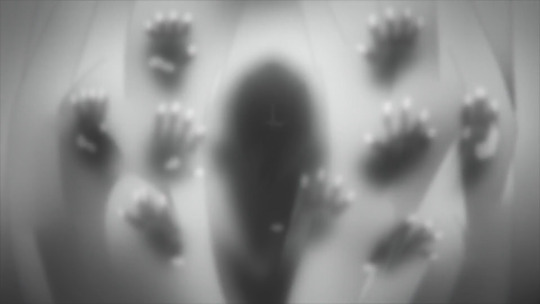
the number of hands is a little odd to me. at first i noticed 4 sets of hand so my immediate thought was “oh, one set for every doa member, minus bram since he doesn’t have any” but noticing that 9th one coming alongside his face threw a wrench in that. so, assuming this number is purposeful, i have a few ideas:
1. it’s not just the doa involved, but the rats as well. both organizations have 5 members we know of. fyodor is in both organizations, meaning that combined, we have 9 people, and a hand for each one
2. it IS just the doa, and 2 hands for each member (bram included), except for fyodor who is both a hand and a head. he is the strategist and planner, thus he is the head, while the others are more like the ones who execute his plans, so they merely get to be hands (not sure how much i love this theory considering at the end of the day he is not their leader, but if you stretch it you could say that in this season we have no reason to assume he isn’t the doa leader so there’s no reason to imply otherwise? or a future implication that he’s letting fukuchi think he’s the leader but is actually manipulating him? yeah i dunno)
3. another one i don’t particularly love, but: it’s less about the number of hands, and rather about the finger highlighting the number 5, since this is going to be a key thing this season
okay, on to a more obvious one:
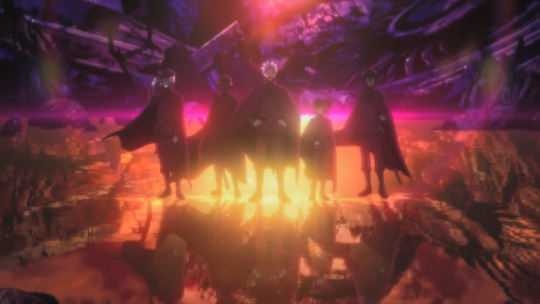
tachihara has his back to us, as to not reveal his identity yet
he is looking upon a purple background, a color we see in some mafia members’ abilities, hinting at him belonging in the mafia
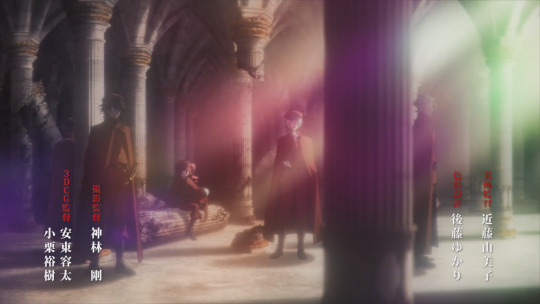
once again, tachihara has his back to us. aside from him, all of the hunting dogs are revealed to the audience and looking forward (even if not 100%), except for fukuchi who is looking to the side, and is behind the pillar, making him visually separated from the rest of the group, since he belongs in the doa rather than the hunting dogs
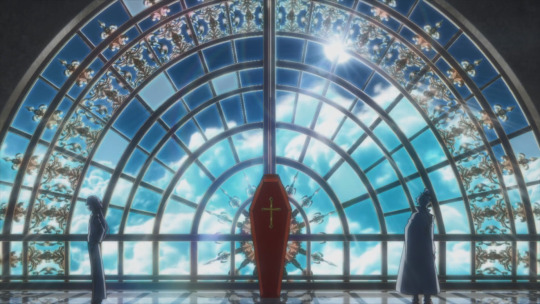
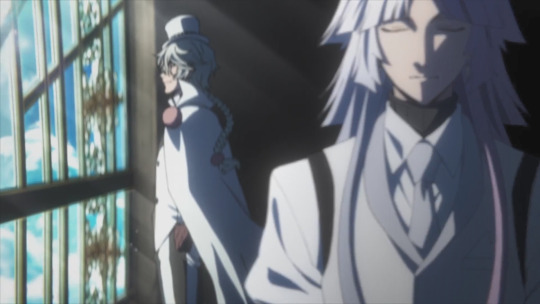
couple of things you might be able to get from this:
1. sigma looking to the side, his back to nikolai and bram. he is not willingly in the doa or supports their goals, more dragged along for the ride. he is a part of the group, but has his eyes shut and his back turned to them, some sort of buffer to imply his separation from them
2. the main thing we see of nikolai is his overcoat. ngl i’m not sure what the symbolism in this could mean but it feels important so i wanna point it out for maybe other people to connect the dots i can’t. possibly, this shot is to highlight the tools at the doa’s disposal, aka sigma and bram as themselves, but nikolai mainly used for his ability...?
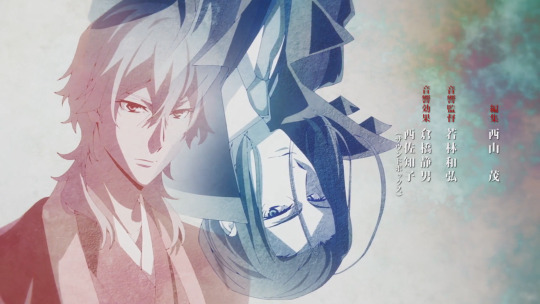
so. first of all. they’re and red and blue, opposites of each other in color and in direction as well
but the interesting thing to me is that they’re each others’ colors - with the ada usually presented in blue and the mafia in red, here we have it backwards. possibly to imply their (partial) role reversal in the eyes of the public, the ada now being demonized and hunted by the law while the mafia gets to lay low and offer assistance
possibly, you could stretch it to say their role reversal is in part about how fukuzawa would have to sacrifice a member for his organization in order to get what he needs, a thing that’s mori-like to do

speaking of blue to symbolize the ada, ango is clad in a blue light, implying his upcoming alliance with the ada
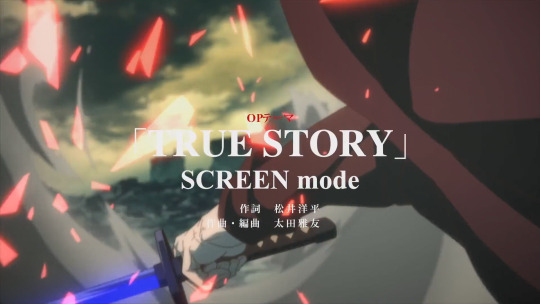
we see fukuchi using shintō amenogozen in his battle with atsushi and akutagawa
i’ve seen people say this part of the op implies their battle will be in this season and i’m ngl, i don’t think there’s any chance of that. it’s way too much story to cram into this season. i think this part is, for now, just to imply the ada and pm working together against the hunting dogs, and him using this sword and fighting them at the same time is just a nod to sharp eyed manga readers (same with the bram cameos)
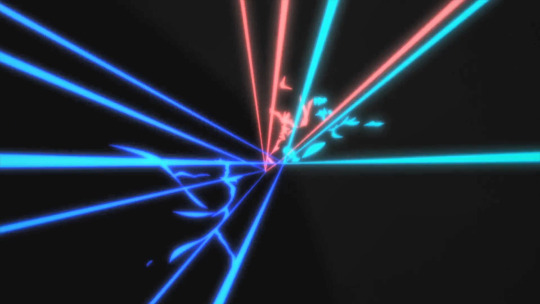
that being said. i want you to pay attention to the color of his ability in this frame (it’s a surprise tool that’ll help us later!)

yosano and the butterfly, and we specifically see her from the side, with her butterfly hairpin shining, putting emphasis on her upcoming backstory
okay, now we’re getting into the character face closeups, and here i’m gonna use these handy posts from @/dazaistabletop for reference, bless your soul for getting all of them fr 🙏
the main thing i want to get from it is the colors. tldr: the ada is a teal-ish blue, the mafia is red and purple (depending on their abilities), the guild is yellow, the hunting dogs is white, the special division is brownish-orange, the doa are the same dark blue from fukuchi’s ability earlier. this does match the general color of the members’ abilities through every group as well.
when it comes to the order of the frames, i think it’s mostly random (tho, with key characters coming early, and more minor characters we barely even really see this season if at all showing up near the end) except for a few pairs:
dazai and fyodor are the first 2 frames, the key foils of this season
fukuchi and fukuzawa are one after the other because they are divorcing each other
akutagawa and atsushi are the ones to close this section and the opening as a whole, as they often do as the key foils of the entire series
a few frames i want to highlight in particular:

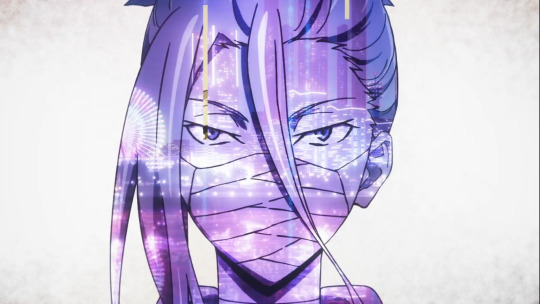
tachihara’s purple is lighter than the other mafia members’ purple (added gin for comparison), implying his belonging to the hunting dogs
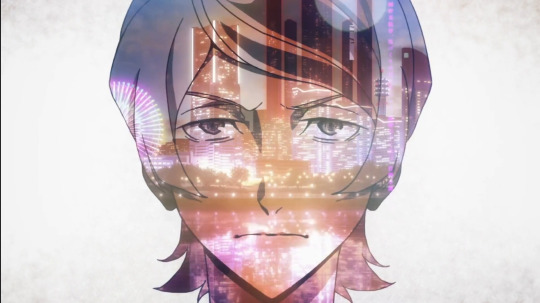
mushi is brown too?? not sure what that implies ngl. mostly pointing it out as a request for anyone to chip in with their own take on that
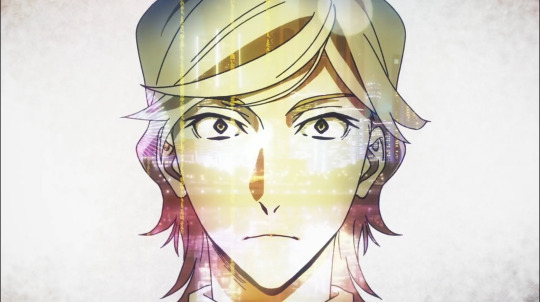
despite not working for the guild anymore (and given that he’s without his glasses we have to assume this is him working for fyodor), nathaniel is still in yellow. like with mushi, i’m not sure what that could mean. maybe they just didn’t want to figure out a color for the rats for 2 frames i dunno. again if you have your own take, hit me
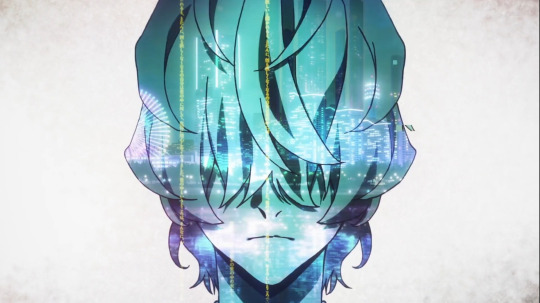
poe is fully colored the same color as the ada 🥺 he’s fully part of the team by now (ok now do lucy next.)

the text appears for just two frames, nikolai and akutagawa. for akutagawa, it blends with his red background, but for nikolai it actively stands out and covers his already covered eye. unfortunately i can’t read japanese, so i would love that if someone who does sees this could tell me what the text says to see if that means something as well 🙏
edit: according to my friend @/almightyrozenidiot apparently it says rashomon! and i’d guess it’s in red because this is the color of this ability, after all. i still think its placement on nikolai’s covered eye is interesting, esp given how much it stands out (the other ability names flashing on screen in that sequence are written in white, i barely even noticed they were there), and i wonder if this might imply some future thing asagiri’s planning between them.
okay, so you were probably wondering why i skipped the fyodor flowers moment, and this is why

so. i tried figuring out what at least some of the flowers are to maybe see if there’s meaning there and either couldn’t, or the ones i did recognize did not align with anything meaning wise, so i figured the colors stand more for the colors of abilities we’ve seen so far, and mainly the ada and port mafia
the faces frames in the end of the op establish the special division’s color as orange, hence the two small orange flowers (and their yellow center could be for the guild). they definitely stand out less, as for now they are a smaller pawn in the plan. the ada - marked with the blue flowers and green leaves - are the biggest target of the current phase of the plan, and that’s why they’re closest to his face and make the most of the flowers, size wise
the only purely white ability we’ve seen so far is natsume’s. as the mediator between the three main organizations in yokohama, it makes sense for him to be in the middle of all these colors. the same white flowers are also on the outside (as seen below), since he is mainly watching things unfold from the side.
will also add that at times, no longer human appears as white or grey as well (tho usually - but not always - with a slight blue tint). this also makes sense given that dazai was in both the mafia and ada, and serves as a mediator or communicator between them at times, hence put in the middle as well.
unfortunately, i can’t tell what the pink flowers are meant to be. the only ability i can think of that’s pink is lucy’s (i don’t recall ever seeing the colored circles when she activates it, but given what anne’s room looks like it seems like a fair assumption), but it’s weird she’d get such a big part of this frame just for herself. maybe it’s because of how big her role is in helping the ada this season? again, if you have your own take please go ahead and share it!!
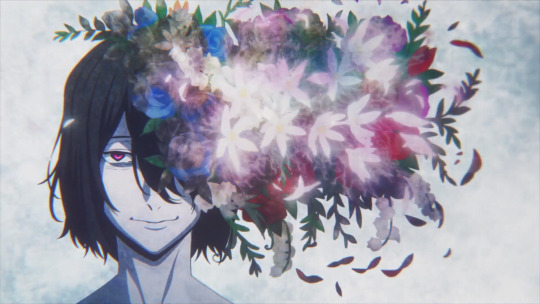

the flowers then stop growing and start withering as the white flowers take over
could not for the life of me find what these flowers are unfortunately, but, white flowers in general usually mean some form of purity and innocence. this does align with fyodor’s ultimate plan - to purify the world of abilities. white flowers often symbolize holiness as well, since his plan is, to him, the will of god
notice that the flowers have 5 petals as well, a repeating number of this arc and in many of the doa’s plans
edit 2: @/larathia pointed out in the comments that these flowers are japanese snake gourds! and apparently, in hanakotoba they mean “hatred of men”. yeah that checks out with fyodor lol
and... i think that’s all i have for you today! i hope you liked it! once again encouraging you to reblog with your own additions on things i might’ve missed or your own take on things, and i hope you all have a lovely day 🙏🖤
#bungou stray dogs#bsd analysis#bungo stray dogs season 4#bsd s4#bsd spoilers#bsd fyodor#bsd fukuchi#bsd fukuzawa#bsd tachihara#bc those 4 are the main repeating characters here hehe#this took like 3 hours to write so i'd really appreciate reblogs if possible 🥺#apologizing for any typos or english errors btw heh. i did type most of this out in a slight frenzy bc this op makes me very excited :P#dan rambles#edit: added some stuff!! hope this doesn't make the post be hidden in search results omg
75 notes
·
View notes
Text
accidentally thought of Horton heard a who as a queer allegory and now I’m sobbing
#edit: I did a whole rant in a reblog btw#film analysis#horton hears a who#queer allegory#I will go into detail if one person asks me to lol#wright writes
19 notes
·
View notes
Text
I think one of the most fascinating aspects of Akutagawa's character is how he's distinctly constantly seeking answers. His very origin story centers around him looking for an answer to the questions: “Why do we live? / Why do I have to be alive?” “Can you give me a reason to live?”


Then again, when he's fighting against Atsushi in chapter 12: “Why? // Why did it have to be you?” “Why does it have to be you?”. It's like he's looking for the reason his life has come to what it is now.

And then, in the fight against Fitzgerald: “Where does that contradictory self-esteem come from?”. This one is interesting, as Akutagawa's questions start revolving around other people's actions rather than solely center over his own life. This time it's like he's really intentioned to understand what drives Atsushi (perhaps, to be able to judge whether Atsushi's reasoning is noble or not, decide if he's a worthy opponent; after finding the answer he will say “An utter disappointment. [...] I could kill you a hundred times, and it would never grant me honor or any military gain.”).

And next, one of the most interesting scenes of Akutagawa asking questions, from an exchange with Atsushi during the cannibalism arc mine break in.
I really like Akutagawa's pressuring, unavoidable questioning here. It looks like he's starting to be really, deeply interested in understanding Atsushi's thinking, which comes off as surprising (why would he be interested in understanding Atsushi's motivations when he hates him?), yet it's definitely there. I find it extremely fascinating as it shows a side of Akutagawa that is open minded and eager to understand others, which strongly clashes with the image of “cutting to threads anyone on his path with no second thought” the reader got used to.
Akutagawa, like he was following his own stream of thoughts, asks: “Why me?”; and then: “Why did you join this operation? [...] Why is a coward like you risking danger for the sake of another person's life?” “Why?” “Why?”
They're pressing questions- you can sense an increasing intensity in his interrogatory. Akutagawa is greedy to know the answer, and won't leave Atsushi any space to avoid him. He wants to understand Atsushi's behavior. He wants to know what drives Atsushi, so that maybe he can be closer to grasp what drives himself, what's the meaning of his life.


It's so evidently important for Akutagawa to know the answer to those questions that, not satisfied, he will bring it up again with Atsushi later, and in a life or death situation nonetheless; it's essential that he understands Atsushi, otherwise their collaboration will never work. “Answer my previous question. Why do you fight?” “There is a way out... [...] But before that, answer me, or I kill you. Why do you fight?”. Notice the imperative mood of “answer my previous question”, the strong command given by “or I kill you”, the urgency conveyed by repeating the same question twice; Akutagawa really wants to know the answer, he needs to understand what moves Atsushi. Because he will soon entrust Atsushi with Rashomon, so he needs to know if Atsushi is worthy; but I believe that, compared to the Moby Dick fight, this time there's more to that. Akutagawa's wish to understand Atsushi's actions isn't limited to judging him; he wants to understand him for the sake of it, because he's starting to be really interested in Atsushi, because he's starting to consider whether his motives aren't as shallow as he initially deemed them to be. Starting to question if Atsushi might actually be not that different from himself. All these questions he relentlessly asks feel like a desperate attempt to put all the pieces together in order to answer to his originary question, or goal, or wish: to give a meaning to his life.
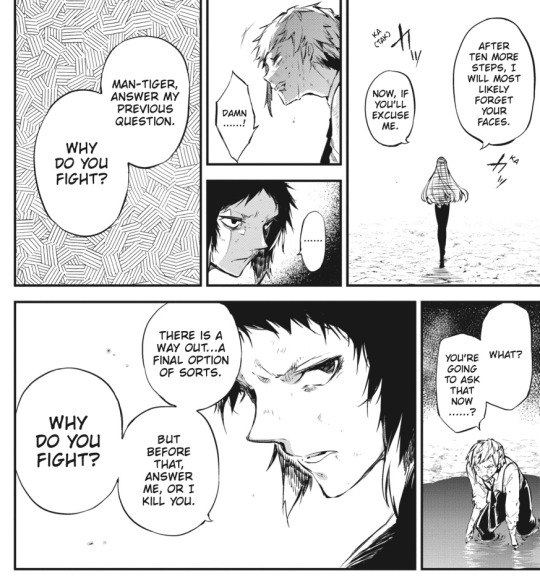
Next, “Why choose me?” “Such a heavy responsibility, why place it on me?” Typical Akutagawa, this time questioning his self worth. Adding to that what he later tells Atsushi “Is everything a trial? What came beyond that night, that forest, was it part of a 'meaningful life'?”, it looks like Akutagawa has spent a long time asking himself if there was a bigger meaning to the way Dazai treated him, to the way Dazai effected his life and, for extension, if all of that was there to give a meaning to his life.

And then, finally, a question being asked to him rather than him voicing it himself but that Akutagawa without doubts asked himself: “Is his life that precious to you?”. Nnnnggghhhhh so this is how everything comes to a conclusion. It's something Akutagawa must have deeply thought through (or, maybe, the answer was already so obvious he didn't have to think of it at all). I really like this segment as it perfectly shows how much Akutagawa has changed and matured since the start of the story. Quite simply, yes, his life does mean that much to him. And that's because in the last months he started to give a new value to life itself. From merciless, ruthless killer he was, he started to cherish other people's lives. And to give other people's lives a meaning is probably the last push he needed towards finding a meaning to his own life, which is the question he's been carrying since the beginning.
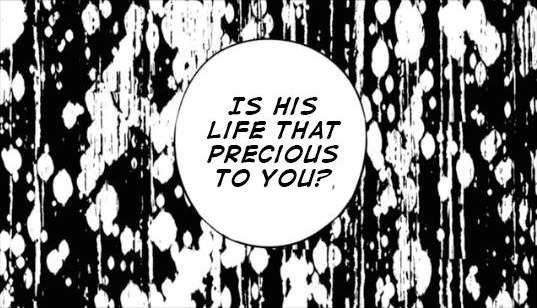
#I LOVE finding answers while writing analysis I'll be writing aimlessly and then be like. Wait I get it now!!!!!!#It's nice ahah#ryūnosuke akutagawa#atsushi nakajima#sskk#Not necessarily romantically though#bsd#bungou stray dogs#bsd analysis#mine#q.#Me as I start writing this: this is purely a reflection on Akutagawa's character–#and has nothing to do with sskk actually you can totally read it taking their relationship as platonic#Me by the end of it: sskk give each other's lives a meaning send tweet#Edit: Oh actually more in reblogs#shin soukoku
224 notes
·
View notes
Text
my take on Ayame is that he's unapologetically himself and knows exactly what he wants out of life, the universe, and everything, but he's also not very good at thinking about other people's points of view. he only knows what he likes and what he would want in a given situation, and he projects that onto other people because he's never had any need to connect with them - they've always flocked around him, no effort to connect needed.
probably the biggest example of this mindset is when Shigure and Hatori urge Ayame to be more open and honest with Yuki, and he decides to do this by...telling Yuki he's a bottom. i'm sure in Ayame's mind, this is a huge sign of trust since it's personal information that you don't hand out to just anyone, but obviously Yuki doesn't see it like that - it just weirds him out. it would weird anyone out honestly, what kind of thing is that to tell someone just out of the blue?
and it makes yet another interesting juxtaposition between Ayame and Yuki, because it's an example of how personality traits can be a double-edged sword. we know a big difference between the brothers is that Yuki never shares his true opinions while Ayame always does, but on the other side of the coin, Yuki is well-versed in interacting with others at their level and Ayame really really isn't. he's always done what he wanted, talking at people rather than to them, and now that he has to actually put in an effort to form a relationship with someone who doesn't think like him, he's fumbling.
Ayame and Yuki are extremely different in a multitude of ways, but one similarity they do share is having the same problem for completely opposite reasons: Yuki can't connect with people because he never shares his true self, and Ayame can't connect with people because he shares too much of his true self without letting them share back.
#i reblogged a post a while back saying that ayame is a genuine clinical narcissist#and honestly yeah. he really kinda is#i think ayame survived the sohma family's toxicity by cutting off all access to opinions apart from his own#and then never learning how to think about other people's povs because of it#honestly i think the reason he was able to start a relationship with mine is because she's on a similar wavelength as him#not to say he doesn't genuinely love her! he absolutely does and i think it's a healthy relationship overall#but if she wasn't someone he could wholeheartedly Get i think he would've blown right past her#bc he didn't know how to empathize with someone who wasn't exactly like him#i think ayame is a very flawed person who doesn't understand the full extent of yuki's trauma or his own narcissism#but he's trying his best to better himself and i respect him for it#fruits basket#ayame sohma#yuki sohma#sage speaketh#analysis#edited for your convenience#(<-cleaned up some wording)
11 notes
·
View notes